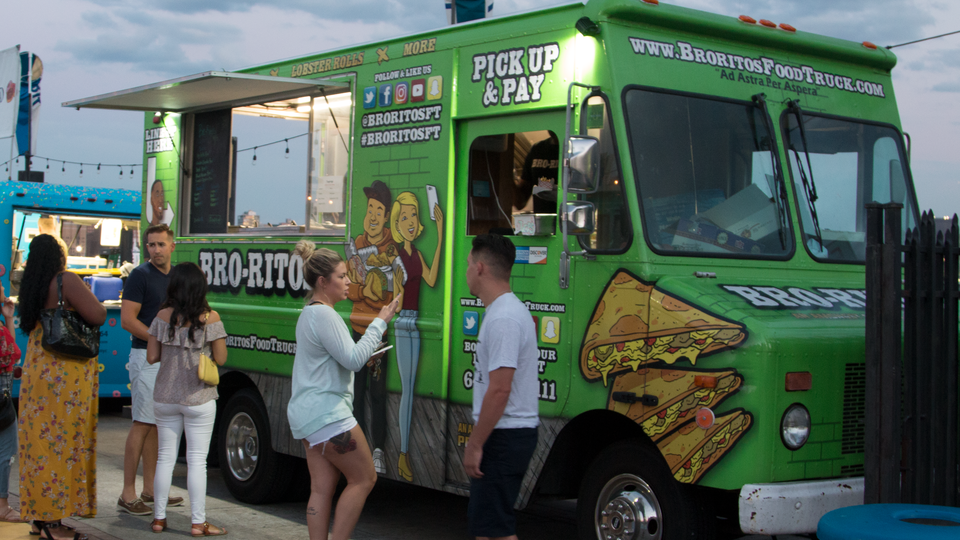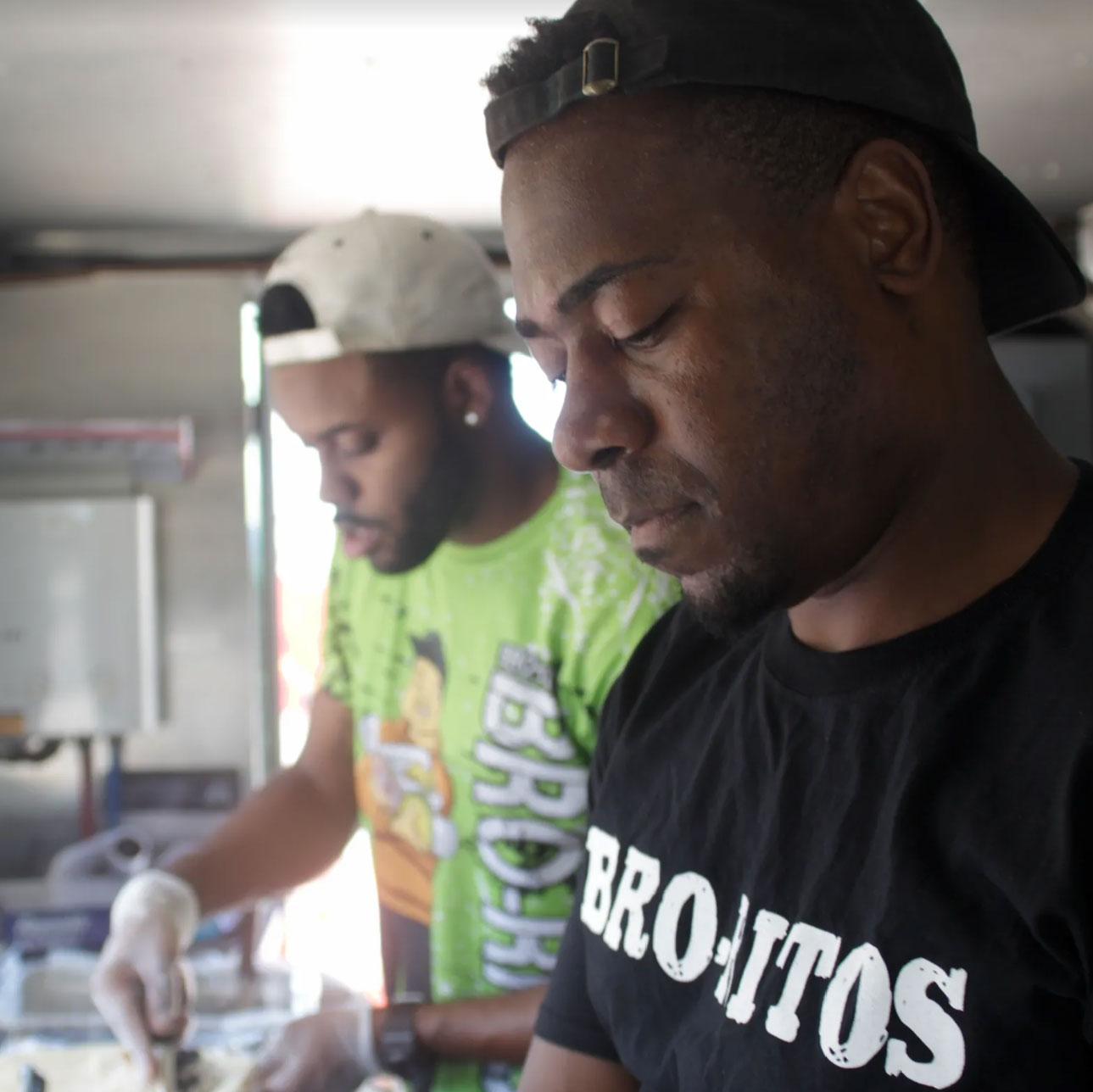Article
Mobile food entrepreneurs find their niche in New Jersey
Partners Marcus Crawford and Jonathan Gibbs learned the ropes of the mobile food business though trial and error, moving from a food trailer to a food truck. They now have their sights set on a brick-and-mortar restaurant.

December 5, 2018 by Elliot Maras — Editor, Kiosk Marketplace & Vending Times
If you have vision, drive and commitment, the rewards will be there. That's what partners Marcus Crawford and Jonathan Gibbs have learned as they set their sights on opening their own restaurant in northern New Jersey.
The two have made a long journey in a few short years, learning the fundamentals of commercial foodservice as operators of a mobile food franchise before launching their own branded burrito concept, Bro-ritos.
If all goes according to plan, they'll open their first brick-and-mortar restaurant next year, serving specialties such as Chipotle Chicken Bro! (pulled baked chicken with sautéed onions, roasted peppers, tomatoes and homemade chipotle sauce) and Hot Cheetos Bro! (ground beef, guacamole, spicy queso, hot Cheetos and sour cream).
Like many entrepreneurs, their success was born of a combination of hard work and a willingness to learn through a process of trial and error.
Starting at the bottom
After earning dual degrees in marketing and real estate from Florida International University Landon Undergraduate School of Business in Miami in 2010, Crawford, a founding partner of Bro-ritos, worked as a server at TGI Fridays, where he found that he liked the restaurant business.
 |
| Partners Marcus Crawford, left, and Jonathan Gibbs prepare lunch for customers. |
His second restaurant gig, at Original Soupman in New York City, gave him the opportunity to work in all aspects of foodservice. He began thinking about what he could do to help build the business, and a food truck struck him as a logical idea. "The food truck market was hot," he said.
Crawford approached the restaurant's management with the idea of running a Soupman food truck under a franchise agreement. Management liked the idea and agreed to Crawford's proposal.
In 2014, the Soupman food trailer came to fruition. Crawford opted for a trailer, which was more affordable than a truck. He purchased a 2008 concession trailer that previously was used for serving sandwiches.
The trailer came with a steam table, refrigeration, an exhaust hood, a three-compartment sink and a hand-wash sink. Crawford added soup kettles, as well as a panini grill for lobster rolls. He also hired a graphic artist to create a wrap using Original Soupman graphics.
He covered the $19,000 investment with credit cards.
Overcoming obstacles
The only problem was that he could not get a permit to operate a mobile food vehicle in New York City.
"The New York City permitting situation is pretty ridiculous," Crawford said. "You have to get a permit on the black market. That can range from $15,000 to $20,000 a year."
He did not let this stop them; their solution was to operate in New Jersey. Crawford had grown up across the bay from Staten Island in Old Bridge, New Jersey, and was familiar with the area.
Operating in New Jersey brought its own challenges, though, as each municipality required its own health and fire safety inspections. He ended up getting health department inspections from more than 25 cities at a cost of $50 to $450 each, plus fire department inspections at a cost of $54 each.
After working with different commissaries, he opted to park the trailer on the street at night, after vandalism turned out to be a bigger problem at the commissaries.
Crawford served a limited version of the Original Soupman menu and prepared everything on the trailer. "I quickly found out that 12-hour days were the norm," Crawford said.
He hired Gibbs, a long-time friend, as his first employee, to help serve customers. After his first year, Gibbs, through sweat equity, became a partner in he business.
The partners didn't have any trouble finding festivals to serve across northern New Jersey on weekends. These events were their mainstay in the beginning, with earnings varying based on fees and festival attendance. They posted their weekly schedule on social media.
During the week, they parked in downtown Newark and Jersey City at lunchtime. Both cities charged reasonable fees for food trucks in the beginning. Later, Newark raised its parking fees, forcing the partners to focus exclusively on Jersey City for downtown lunch business.
"The sales were decent the first year," Crawford said. "Once we learned the industry a little more, we were able to double our sales in the second year." Knowing the best festivals to attend was a big part of it, he said.
Fine tuning the business
Another important factor was focusing less on soups and more on lobster rolls. The native New England sandwich consists of lobster meat on a grilled bun with an opening in the top. The partners sold as many as 400 lobster rolls in three or four hours at some events.
Crawford paid off his initial investment within the first year.
Things went well for the first six months, until Crawford and Gibbs began to encounter problems getting inventory consistently from the restaurant, which was experiencing management issues.
As they struggled to maintain inventory, the partners also found that they were not offering the most popular street foods in their market — chicken and burritos. So, they began to plan a new business around these items.
They also recognized the advantages of operating a truck rather than a trailer. "People want an actual truck for the food truck atmosphere," Crawford said.
Besides, he said, a truck is easier to maneuver than a trailer. "You really can't parallel park a trailer, which is really a bit of a hassle. We wanted to be able to turn the key and go."
Part two of this two-part series will explore the introduction of the Bro-Ritos food truck.
About Elliot Maras
Elliot Maras is the editor of Kiosk Marketplace and Vending Times. He brings three decades covering unattended retail and commercial foodservice.
 ChatGPT
ChatGPT Grok
Grok Perplexity
Perplexity Claude
Claude





